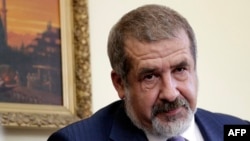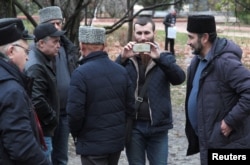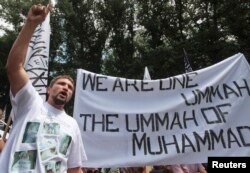Moscow's recent raids in Simferopol are part of a broader effort to suppress democratic activists in the Russian-controlled Black Sea Peninsula. That's the assertion being made by Refat Chubarov, chairman of the Mejlis, the Crimean Tatars' self-governing body that Russia has outlawed.
Crimean Tatars, who are predominantly Muslim, confronted Russian security forces on Wednesday after 20 people were detained in what Russian officials called a sweep for suspected Islamist militants.
Ukraine's representative to the European Union, Ambassador Mykola Tochytskyi, immediately called on European partners to "harshly and decisively" condemn the "illegal" searches of homes and arrests, triggering broad international condemnation by U.S. and EU representatives who believe Crimean Tatars are being targeted for speaking out against Russian rule in the territorially disputed region.
"As I see it, one of the main reasons why we've had the record-high number of people arrested in one day last Wednesday — for all five years since the occupation of Crimea — is the desire of Russian occupants to threaten the community of Crimean Tatars as much as they can," Chubarov told VOA's Russian service. "It's the desire to push the Crimean Tatars out. I don't really see any other explanation of this."
According to Chubarov, Russian security forces not only raided private homes but also detained any local activists who were attending court hearings in support of Ukrainians and Tatars who've been jailed without sentencing.
"They arrested any activists," he said. "Even the ones who stood next to the court building in Simferopol during the two-day trial of jailed Ukrainian sailors, the ones who were livestreaming everything.
"Thanks to them, the international community and the society has learned about what's happening in Crimea," he added. "Put simply, they arrested the most active people, which allows me to infer that they're attempting to isolate everything that's happening in Crimea from the outside world and, at the same time — thanks to the large number of arrests — they're also sending a very clear message to the Crimean Tatars: 'If you don't like it here, leave.' "
The message, Chubarov said, was reiterated by pro-Russian Crimean Prime Minister Sergei Aksyonov, who prior to the 2014 annexation had been an obscure figure in local politics. His Russian Unity party holds only a trio of seats in the regional legislature.
"Aksyonov openly talked about it in a YouTube interview, in which he said that the Council of Ministers of Crimea fully supports the FSB's attempt to put an end to radical underground organizations," said Chubarov. "He finished the interview by saying that anyone who doesn't like Russian Crimea can leave and live happily in other countries. Basically, Aksyonov openly voiced what Moscow is aiming to achieve but doesn't say publicly."
Ukraine's Foreign Ministry immediately protested the arrests, expressing concern that the Russian occupation authorities again chose the so-called "Hizb ut-Tahrir ban" as a pretext for searches.
Russian security forces have targeted members of the Hizb ut-Tahrir group ever since Russia annexed Crimea in 2014 in a move that Ukraine and almost all of the world view as illegal. The Islamist group is not banned in Ukraine, but Russia and several other ex-Soviet nations consider it to be a terrorist organization.
The Ukrainian Foreign Ministry decried the raids as human rights violations that may represent the start of a new wave of persecution against Crimean Tatars.
As AFP reported, the majority of Crimean Tatars have refused to renounce their Ukrainian citizenship and many are planning to vote in the first round of Sunday's presidential poll.
This story originated in VOA's Russian service. Some information in this report came from AFP.






